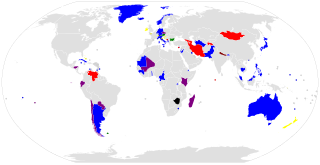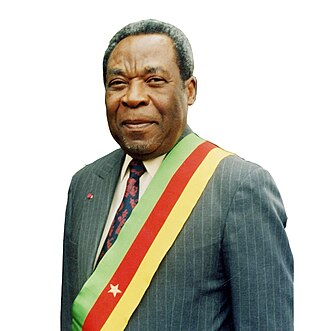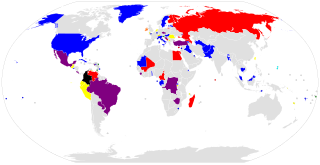
Cameroon, officially the Republic of Cameroon, is a country in Central Africa. It shares boundaries with Nigeria to the west and north, Chad to the northeast, the Central African Republic to the east, and Equatorial Guinea, Gabon and the Republic of the Congo to the south. Its coastline lies on the Bight of Biafra, part of the Gulf of Guinea and the Atlantic Ocean. Due to its strategic position at the crossroads between West Africa and Central Africa, it has been categorized as being in both camps. Its nearly 27 million people speak 250 native languages and English or French or both.

The politics of Cameroon takes place in a framework of a unitary presidential republic, whereby the President of Cameroon is both head of state and head of government, and of a multi-party system. A prime ministerial position exists and is nominally head of government, implying a semi-presidential system, although de facto only serves to assist the president. Executive power is exercised by the government. Legislative power is vested in both the government and the National Assembly of Cameroon.

The politics of the Central African Republic formally take place in a framework of a semi-presidential republic. In this system, the President is the head of state, with a Prime Minister as head of government. Executive power is exercised by the government. Legislative power is vested in both the government and parliament.
Unicameralism is a type of legislature, which consists of one house or assembly, that legislates and votes as one. Unicameralism has become an increasingly common type of legislature, making up nearly 60% of all national legislatures and an even greater share of subnational legislatures.

The Inter-Parliamentary Union is an international organization of national parliaments. Its primary purpose is to promote democratic governance, accountability, and cooperation among its members; other initiatives include advancing gender parity among legislatures, empowering youth participation in politics, and sustainable development.

The Cameroon People's Democratic Movement is the ruling political party in Cameroon. Previously known as the Cameroonian National Union, which had dominated Cameroon politics since independence in the 1960s, it was renamed in 1985. The national president of the CPDM is Paul Biya, the president of Cameroon, while the secretary-general of the party Central Committee is Jean Nkuete.
The Commonwealth Parliamentary Association (CPA), previously known as the Empire Parliamentary Association, is an organisation which works to support good governance, democracy and human rights.

Cameroon elects, on a national level, a head of state – the president – and a legislature. The president is elected for a seven-year term by the people; a two-term limit on the office was removed through a parliamentary vote in April 2008. The National Assembly has 180 members, elected for a five-year term in 49 single and multi-seat constituencies. Cameroon also has a Senate, with 100 elected officials, each serving 5 years. 70 of these are elected by a regional council, while 30 are elected directly from the president.

The National Assembly is the lower house of the Parliament of Cameroon. It has 180 members, elected for five-year terms in 49 single and multi-seat constituencies. Together with the senate, it constitutes the legislative arm of government.

The Constitution of Cameroon is the supreme law of the Republic of Cameroon. Adopted in 1972, it is Cameroon's third constitution. The document consists of a preamble and 13 Parts, each divided into Articles. The Constitution outlines the rights guaranteed to Cameroonian citizens, the symbols and official institutions of the country, the structure and functions of government, the procedure by which the Constitution may be amended, and the process by which the provisions of the Constitution are to be implemented.

Cavayé Yéguié Djibril is a Cameroonian politician who has been the President of the National Assembly of Cameroon since 1992. He is a leading member of the Cameroon People's Democratic Movement (CPDM).
Jean-Bernard Ndongo Essomba was a Cameroonian politician. He was President of the Parliamentary Group of the Cameroon People's Democratic Movement (RDPC) in the National Assembly of Cameroon from 1992 to 1997 and he has held that post again since 2002.

The Republic of Cameroon is a decentralized unitary state.

Parliamentary elections were held in Cameroon on 10 April 1960. They were the first elections held in accordance with the new constitution, approved in a referendum in February, which created a unicameral federal National Assembly. The result was a slim victory for the Cameroonian Union, forcing it to govern in coalition. However, the elections were marred by severe irregularities.

Parliamentary elections were held in Cameroon on 30 September 2013, alongside local elections. They were originally scheduled for July 2012, February 2013 and July 2013, but were repeatedly postponed.

This national electoral calendar for 2013 lists the national/federal elections held in 2013 in all sovereign states and their dependent territories. By-elections are excluded, though national referendums are included.

Marcel Niat Njifenji is a Cameroonian politician who has been President of the Senate of Cameroon since 2013. A member of the ruling Cameroon People's Democratic Movement (RDPC), he previously served for years as Director-General of the National Electricity Company, and he was also a minister in the government during the early 1990s.
Roger Nkodo Dang is a Cameroonian politician. He became President of the Pan-African Parliament in 2015. On 27 May 2015, he obtained 85 votes to be elected as the successor to former president Bethel Nnaemeka Amadi. Dang is a member of the National Assembly of Cameroon.

This national electoral calendar for 2018 lists the national/federal elections held in 2018 in all sovereign states and their dependent territories. By-elections are excluded, though national referendums are included.

Parliamentary elections were held in Cameroon on 9 February 2020, together with municipal elections. The Cameroon People's Democratic Movement retained its majority in parliament, winning 139 of the 167 seats decided on election day.









